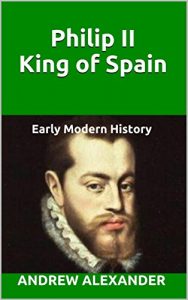King Philip II of Spain dominated Western Europe in the second half of the sixteenth century as had his father, Charles V, in the first half.
Philip controlled a vast empire, Spain, Portugal, the Netherlands, much of Italy, the New World and the old Portuguese trading colonies in Africa, India and the Far East. However, with these vast resources came equally challenging commitments and the enmity of England, France, the Pope and many of his subjects.
This 8,400-word study provides the reader with an understanding of Philip II and his domestic and foreign policies, both as a commentary in its own right, and as a stepping-stone to further research.
The main areas covered in this work are:-
• Philip’s early life and character.
• Philip’s role in the government of Spain.
• Philip’s sources of revenue.
• How Philip’s religious beliefs affected his policies?
• The three major revolts; the Moriscos, the Aragonese and the Dutch.
• A conclusion on the successes and failures of Philip’s domestic policies.
• Spain and the Turks.
• Spain and Portugal.
• Spain and England.
• A conclusion on the successes and failures of Philip’s foreign policy; pre-1580 and post-1580.
Early Modern Age Series by Andrew Alexander:
Europe in 1500
Ferdinand of Aragon and Isabella of Castile
Charles V – Holy Roman Emperor
The Protestant Reformation
Philip II – King of Spain
Henry IV – King of France
Cardinal Mazarin – Chief Minister of France
Cardinal Richelieu’s Foreign Policy
Louis XIV – King of France
The Decline of Spain in the Seventeenth Century
Peter the Great – Tsar of Russia
Philip controlled a vast empire, Spain, Portugal, the Netherlands, much of Italy, the New World and the old Portuguese trading colonies in Africa, India and the Far East. However, with these vast resources came equally challenging commitments and the enmity of England, France, the Pope and many of his subjects.
This 8,400-word study provides the reader with an understanding of Philip II and his domestic and foreign policies, both as a commentary in its own right, and as a stepping-stone to further research.
The main areas covered in this work are:-
• Philip’s early life and character.
• Philip’s role in the government of Spain.
• Philip’s sources of revenue.
• How Philip’s religious beliefs affected his policies?
• The three major revolts; the Moriscos, the Aragonese and the Dutch.
• A conclusion on the successes and failures of Philip’s domestic policies.
• Spain and the Turks.
• Spain and Portugal.
• Spain and England.
• A conclusion on the successes and failures of Philip’s foreign policy; pre-1580 and post-1580.
Early Modern Age Series by Andrew Alexander:
Europe in 1500
Ferdinand of Aragon and Isabella of Castile
Charles V – Holy Roman Emperor
The Protestant Reformation
Philip II – King of Spain
Henry IV – King of France
Cardinal Mazarin – Chief Minister of France
Cardinal Richelieu’s Foreign Policy
Louis XIV – King of France
The Decline of Spain in the Seventeenth Century
Peter the Great – Tsar of Russia






